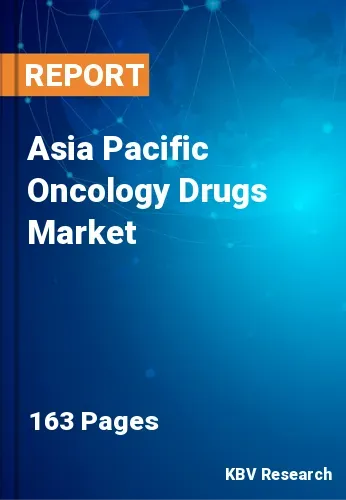The Asia Pacific Oncology Drugs Market would witness market growth of 8.5% CAGR during the forecast period (2023-2030).
The advent of molecular biology and genomic sequencing technologies has unraveled the intricate genetic mutations and alterations that drive cancer progression. This deeper understanding of the molecular landscape of various cancers has paved the way for developing targeted therapies designed to specifically inhibit or modulate the aberrant pathways responsible for tumor growth. Immunotherapy has emerged as a game-changer in the market. Immunotherapeutic agents have demonstrated remarkable success in treating certain cancers by harnessing the body's immune system to identify and eliminate cancer cells. Checkpoint inhibitors, CAR-T cell therapies, and cancer vaccines are innovative immunotherapies that have shown promise in improving patient outcomes.
The era of personalized drugs has arrived, and the market is at the forefront of this paradigm shift. Biomarker discovery, driven by advances in omics technologies, allows for identifying specific genetic, epigenetic, or proteomic signatures associated with different cancer types. This information enables the development of drugs tailored to individual patients, optimizing treatment efficacy, and minimizing side effects. Pharmaceutical companies and research institutions invest heavily in oncology research and drug development. The competitive landscape is characterized by many players striving to bring novel therapies to market. These investments drive innovation and contribute to expanding the market, offering patients a more comprehensive array of treatment options.
The Asia Pacific region has grown substantially in its biotechnology and pharmaceutical industries. Increased investment in research and development by domestic and multinational companies has fueled the development and commercialization of these drugs. The implementation of precision medicine in breast cancer treatment involves tailoring therapies based on the specific genetic and molecular characteristics of individual tumors. Genomic testing allows oncologists to identify targetable mutations, guiding the selection of personalized drugs. The factors mentioned above will propel the market growth in this region.
The China region dominated the Asia Pacific Oncology Drugs Market by Country in 2022 and would continue to be a dominant market till 2030; thereby, achieving a market value of $19,020 million by 2030. The Japan region is registering a CAGR of 7.9% during (2023 - 2030). Additionally, The India region would showcase a CAGR of 9.2% during (2023 - 2030).
Based on Indication, the market is segmented into Breast Cancer, Prostate Cancer, Lung Cancer, Stomach Cancer, Colorectal Cancer, Liver Cancer, Esophagus Cancer, Cervical Cancer, Kidney Cancer, Bladder Cancer and Other Cancer. Based on Drug Class Type, the market is segmented into Targeted Therapy, Immunotherapy (Biologic Therapy), Chemotherapy and Hormonal Therapy. Based on countries, the market is segmented into China, Japan, India, South Korea, Singapore, Malaysia, and Rest of Asia Pacific.
Free Valuable Insights: The Global Oncology Drugs Market is Predict to reach $273.3 Billion by 2030, at a CAGR of 7.7%
The market research report covers the analysis of key stake holders of the market. Key companies profiled in the report include AbbVie, Inc., Amgen, Inc., Astellas Pharma, Inc., AstraZeneca PLC, Bristol Myers Squibb Company, F. Hoffmann-La Roche Ltd., Johnson & Johnson, Novartis AG, Merck & Co., Inc. and Pfizer Inc.
By Indication
By Drug Class Type
By Country

Our team of dedicated experts can provide you with attractive expansion opportunities for your business.

